Thyroid Diet: Foods To Eat For Hypothyroidism & Hyperthyroidism
Because not all foods will be good for you if you have a malfunctioning thyroid gland
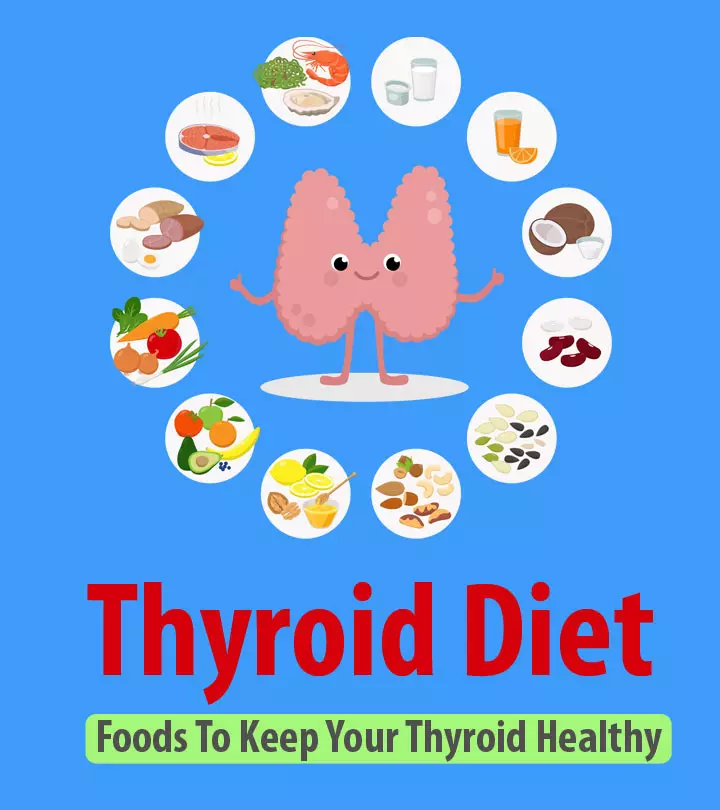
Image: Shutterstock
A thyroid diet is crucial for normalizing thyroid function. The thyroid gland, situated below Adam’s apple, secretes hormones that regulate development, growth, sleep, and menstrual cycle (1). Sometimes, the thyroid can become underactive (hypothyroidism) or overactive (hyperthyroidism). This may cause sudden weight loss or weight gain, stunted growth, depression, irregular periods, and hinder brain development (2).
According to the American Thyroid Association (ATA), it is estimated that over 12% of Americans will develop a thyroid disease some time in their life. It is further estimated that 20 million US citizens have some type of thyroid disease and over 60% of those with thyroid disease are unaware of their issue.
Therefore, it is recommended to go on a thyroid diet. This post tells you what to eat if you have hypothyroidism or hyperthyroidism, along with sample diet plans for each. You should know the nutritional significance of certain foods and vitamins and minerals like iodine, selenium, and zinc to effectively manage thyroid conditions.
 At A Glance: Thyroid Diet
At A Glance: Thyroid Diet- Principle: Focuses on including nutrient-rich, anti-inflammatory foods and avoiding specific food groups (like gluten-rich foods) to support optimal thyroid function and manage related symptoms.
- Purpose: To help regulate thyroid hormone production and promote overall thyroid health.
- Who It Is For: Individuals with hypothyroidism or hyperthyroidism.
- Duration: Long-term
- Who Should Avoid: People with a history of eating disorders, pregnant or breastfeeding individuals, and people taking anticoagulants and antibiotics.
- Cons: Dietary restrictions may be challenging to follow in the long term. It may lead to nutritional deficiencies.
In This Article
Hypothyroidism Diet – Foods To Eat
Hypothyroidism can lead to a disrupted menstrual cycle, weight gain, constipation, goiter, depression, dry skin, hair fall, muscle fatigue, slow heart rate, high blood cholesterol, and a puffy face. Apart from medicines, you can consume these foods to boost your thyroid function.
1. Iodized Salt
According to the American Thyroid Association, iodine is needed for the production of the thyroid hormone. Iodine deficiency can lead to hypothyroidism and goiter (3). Since your body cannot produce iodine naturally, you should eat thyroid-healing foods that contain a good amount of iodine. And the best way to do that is to consume iodized salt.
2. Brazil Nuts
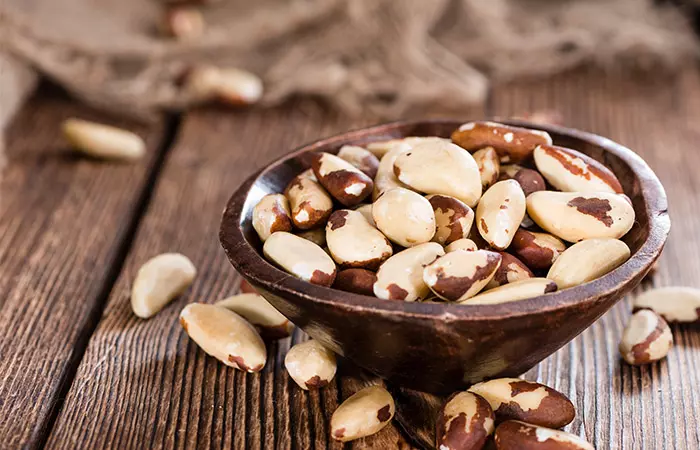
Brazil nuts are a great source of the mineral selenium that helps catalyze the conversion of the inactive thyroid hormone to the active form. Scientists have found that Brazil nut supplementation improved thyroid hormone levels (4).
Selenium also helps reduce inflammation and inhibits cancer cell proliferation. You can consume up to 8 Brazil nuts per day. Do not eat too many as it may lead to nausea, diarrhea, and vomiting.
3. Fish
Fish are rich in omega-3 fatty acids and selenium (5). Omega-3 fatty acids help lower LDL cholesterol, and selenium keeps your thyroid hormone kicking (6), (7). Consume salmon, sardines, and tuna to counteract hypothyroidism. You can have 3-5 oz fish every day. Make sure not to overcook the fish.
4. Bone Broth

By consuming bone broth, you can kill two birds with one stone. First, bone broth contains the amino acids glycine and proline that help repair the digestive lining and improve hypothyroidism. Second, hypothyroidism can fracture your bones and having bone broth can help strengthen your bones (8).
Consume a cup of bone broth for lunch or dinner. Toss in some vegetables. Make sure to cook the vegetables properly. Raw cruciferous vegetables like cabbage, cauliflower, turnip, and brassica seeds contain goitrin, an active goitrogen that reduces thyroid hormone secretion (9). However, proper cooking destroys the goitrogen factor.
5. Vegetables And Fruits
Green leafy vegetables, colorful vegetables, and fruits are great sources of minerals, vitamins, antioxidantsi A man-made or natural substance that resists cell damage or slows down the process of damage. Fruits and vegetables contain antioxidants. , and dietary fiber. However, you should be careful if you have hypothyroidism because a few veggies and fruits can hinder the production of the thyroid hormones and are known as goitrogens.
Vegetables such as cauliflower, spinach, kale, broccoli, cabbage, radish, peach, avocado, and mustard greens are goitrogens (10). However, cooking these veggies and fruits properly can render the goitrogens inactive.
Katie, a lifestyle vlogger, shared how she treated her hypothyroidism symptoms . She included leafy greens in her diet and avoided cruciferous vegetables and sprouts as they are hard to digest. She says, “The ones I like to eat plenty of are things like asparagus and a lot of spinach. You need the iron, iodine, and different things from those vegetables to really help your body and your thyroid function more properly and you want to make sure you’re able to absorb the iodine which again is really important for that thyroid function (i).”
6. Seaweed
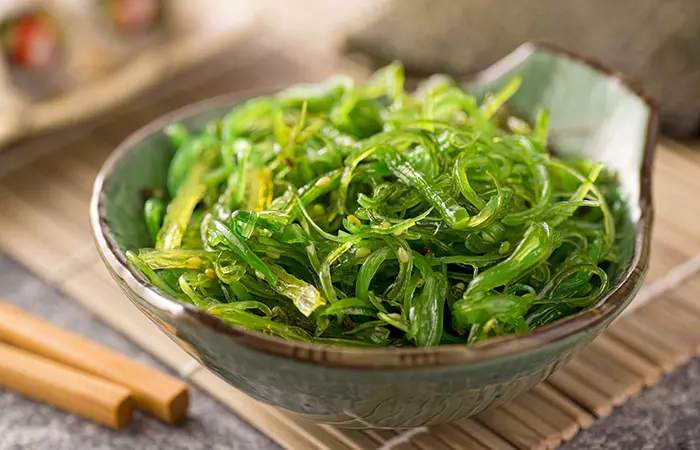
Seaweed like nori, kelp, and kombu help treat hypothyroidism as they are great sources of iodine, B-vitamins, riboflavin, and pantothenic acid. They absorb more iodine from the sea and also contain an amino acid called tyrosine, which is the most important amino acid to form thyroid hormones (11).
They help upregulate the thyroid hormone production, uplift mood, prevent lethargy, and improve brain function. You can have up to 150 mcg of seaweed per day.
 Quick Tip
Quick Tip7. Dairy
Low-fat milk, yogurt, and cheese are rich in iodine and selenium that help boost thyroid hormone production and activation. They are also rich in the amino acid tyrosine that helps combat the symptoms of hypothyroidism like depression and fatigue (12).
Have a glass of milk, half a cup of yogurt, and ⅙ cup of cheese per day to increase the thyroid hormone levels.
8. Beef And Chicken
Your thyroid function can also be accelerated by providing your body with the required amounts of zinc. It is mostly found in beef and chicken and can help convert triiodothyronine (T3) to thyroxine (T4). This conversion is of great importance because T3 is the inactive form while T4 is the active form of the thyroid hormone. Consume at least 3 oz of chicken breast or lean cuts of beef to boost thyroxine production. Zinc supplementation also improves the hormonal balance (13).
9. Eggs
Eggs, especially the yolk portion, are a great source of iodine and can help alleviate hypothyroidism (14). Include whole eggs 2-3 times in a week in your diet, depending on your lipid profilei A common blood test to check the amount of cholesterol and triglycerides in your blood. It helps detect any irregularities related to cardiovascular diseases. .
 Did You Know?
Did You Know?10. Shellfish
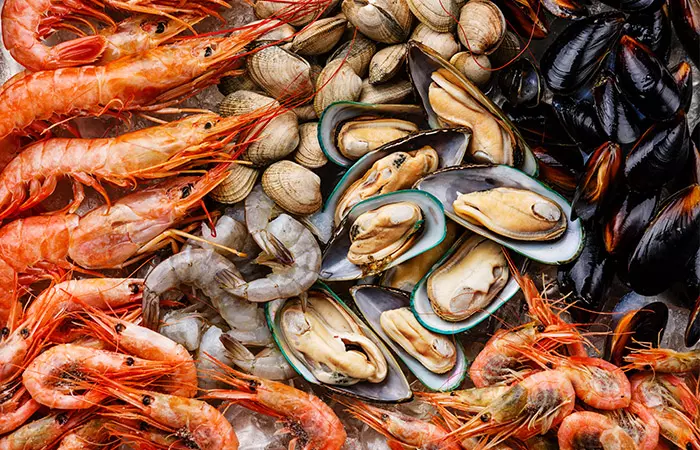
Shellfish like shrimp and lobster are packed with iodine and zinc. And, as you know, iodine and zinc can help boost the production of the thyroid hormone. Consume at least 3 oz shellfish to improve your thyroid levels (15).
11. Extra Virgin Coconut Oil
Virgin coconut oil contains high levels of lauric acid, a medium-chain triglyceride that is converted into monolaurin and has antimicrobiali An agent produced by a living body that kills or stops the growth of fungi, bacteria, algae, and parasites. and anti-inflammatoryi Any substance that stops or decreases inflammation. They also help reduce pain, redness, tenderness, and fever. properties and improves metabolismi The complex process of chemical reactions that change food into energy in our bodies in order to sustain life. (16).
Add 1-2 tablespoons of extra virgin coconut oil to your smoothie or use it as a salad dressing.
12. Flax Seeds
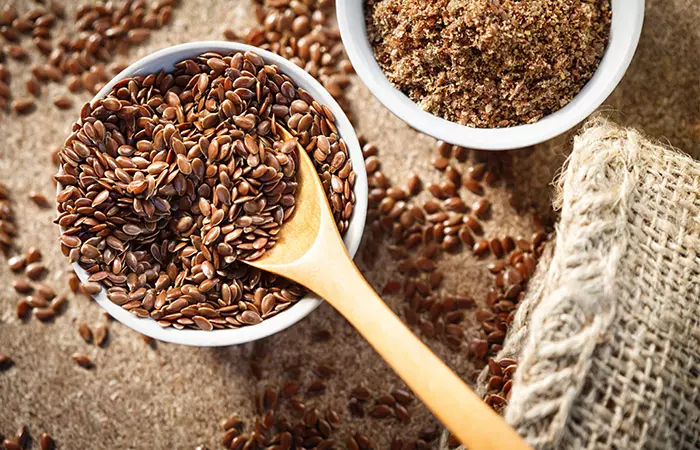
Flax seeds are a great source of omega-3 fatty acids, zinc, selenium, and iodine (17). Flax seeds are also good for weight loss (18).
Add 2-3 tablespoons ground flax seeds to your smoothie or breakfast cereal, or use flax seed oil for cooking.
13. Legumes
Legumes are rich in iodine and zinc and are gluten-free (19). You can consume lentils, beans, bean sprouts, chickpeas, etc. to boost your thyroid gland hormone secretion.
14. Fiber-Rich Foods
Add fiber-rich foods to your diet because if you have hypothyroidism, chances are you also experience indigestion and constipation. Fiber helps improve bowel movement and digestion (20).
Include foods such as papaya, cooked green leafy veggies, and gluten-free whole grains to improve your digestion. Here’s a list of high-fiber foods for weight loss.
15. Sunflower Seeds
Sunflower seeds are brilliant sources of polyunsaturated fatty acids (21). Polyunsaturated fats have antioxidant and anti-inflammatory properties that may help alleviate symptoms of hyperthyroidism (22).
You can consume them raw or roasted or incorporate them in your meals such as salad toppings, smoothies, baked goods, and breakfast bowls.
16. Water
Water helps hydrate your body and flush out toxins (23). Drink 3-4 liters of clean water per day to help your cells function properly. Though water may not directly help you tackle hypothyroidism, drinking enough of it can help your organs function properly.
These are the 15 foods you should consume if you have hypothyroidism. Adding a range of these foods to your diet may help improve your thyroid health. It is important to talk to a healthcare provider for personalized guidance. Here is a sample diet chart to help you understand how you should plan your daily meals.
Key Takeaways
- Include foods rich in iodine and selenium such as whole grains, dairy products, and seafood for those who suffer from hypothyroidism.
- Foods that include raw fruits and vegetables, lean proteins, and herbs should be consumed by people suffering from hyperthyroidism.
- In a thyroid diet, processed foods and added sugars should be kept to a minimum.
- Gluten should be avoided since it may affect how well thyroid hormones are absorbed.
Sample Hypothyroidism Diet Plan
Note:Consult your doctor before starting this diet plan.
| Meals | What To Eat |
|---|---|
| Early Morning (7:00 – 7:30 am) | 1 cup warm water with juice of half a lime + 1 Brazil nut + Mixed seeds mixture |
| Breakfast (8:15 – 8:45 am) | 1 boiled egg + oatmeal with apple and flax seed powder + 3 Brazil nuts |
| Lunch (12:00 – 12:30 pm) | Seaweed salad with 1 tablespoon extra virgin coconut oil or shrimp lettuce wrap with salsa dip |
| Evening Snack (4:00 pm) | 1 peach + 1 cup yogurt bowl |
| Dinner (7:00 pm) | 1 cup bone broth/grilled salmon/lentil soup with thoroughly cooked vegetables |
Avoid consuming the foods mentioned below.
Foods To Avoid To Treat Hypothyroidism
- Raw cruciferous vegetables like cabbage, cauliflower, turnip,etc.
- Gluten-containing foods.
- High-sugar foods as uncontrolled insulin spikes deteriorate the hypothyroidism condition.
- Junk food and processed foods, like deep-fried foods, batter-fried foods, potato wafers, French fries, etc. These foods have a truckload of sodium but no iodine or nutritional value. They will only increase the cholesterol levels and take a toll on your health.
- Green tea. There are many studies that have confirmed that green tea possesses anti-thyroid properties and consuming excessive green tea can cause hypothyroidism (24). Herbal teas for thyroid health can also prove beneficial.
If you have an overactive thyroid, you must go on a hyperthyroidism diet. Here’s a list of foods you can eat:
Hyperthyroidism Diet – Foods To Eat
Hyperthyroidism leads to weight loss, increased heart rate, anxiety, irritability, irregular periods, bulging eyes, insomnia, difficulty in concentrating, increased hunger, and moist skin (25). Apart from your doctor-prescribed medicines, certain foods can also help with hypothyroidism treatment at home. Here’s the list.
1. Raw Fruits And Vegetables
Raw cruciferous vegetables or leafy greens are goitrogens, i.e., they inhibit the production of the thyroid hormones (9). This is exactly what you need as your thyroid is overactive.
Consume broccoli, spinach, kale, bok choy, cabbage, lettuce, Chinese cabbage, carrot, cauliflower, radish, collard greens, rocket spinach, Brussels sprouts, bell pepper, tomato, apple, berries, kiwi, orange, lemon, grapefruit, etc.
2. Millets And Brown Rice
Millets and brown rice also have high goitrogenic activity (9). They are a great source of dietary fiber, vitamins, and minerals. You can consume ½-1 cup brown rice or millets per day to suppress the overproduction of the thyroid hormone.
3. Lean Proteins
Have chicken breast, fish, mushroom, soy chunks, and legumes to help build lean muscle mass. Hyperthyroidism leads to an increased appetite and rapid weight loss. Since proteins take much longer to digest, they will keep you full for a longer duration (26).
4. Herbs
Basil, oregano, and rosemary are anti-inflammatory in nature and can help alleviate the problem of hyperthyroidism (27). These are amazing herbs for thyroid and can make a huge difference in your health.
These are the four main food groups that can act as a dietary aid to treat hyperthyroidism. Here’s your diet chart.
Sample Hyperthyroidism Diet Chart
This sample meal plan will help you include foods that support thyroid health in your daily diet. Feel free to change portion sizes and ingredients based on your individual nutritional needs and preferences.
Note:Consult your doctor before starting this diet. May vary from person to person as per the activity level.
| Meals | What To Eat |
|---|---|
| Early Morning (7:00 – 7:30 am) | 2 cups room-temperature water |
| Breakfast (8:15 – 8:45 am) | Tomato+apple+grapefruit smoothie and 2 boiled eggs |
| Mid-Morning (10:30 am) | 1 medium cup baby carrots with a dash of lime juice and sea salt |
| Lunch (12:30 – 1:00 pm) | Tuna/chicken/mushroom salad with spinach, asparagus, kale, tomato, and tofu |
| Evening Snack (4:00 pm) | 370 ml watermelon juice + 20 kernels of in-shell pistachios |
| Dinner (7:00 – 7:30 pm) | Kidney bean chili or grilled fish with herbs and veggies |
Now, let’s take a look at the foods to avoid if you have hyperthyroidism.
Foods To Avoid To Treat Hyperthyroidism
There is a huge selection of foods to eat for thyroid health. However, just like there are thyroid healing foods, there are foods to avoid with hypothyroidism. Scroll down below for the list –
- Iodine-, zinc-, and selenium-rich foods, such as shellfish, oysters, seaweed, eggs, and Brazil nuts
- Artificial sweeteners
- Milk and milk products
- Alcohol and aerated drinks
- Packaged or artificially flavoredi Non-natural flavors that are produced in a lab to emulate and provide the taste of natural ingredients. and colored foods
Other Useful Tips
- Eat every 2 hours.
- Consume fiber-rich, green, leafy veggies and probiotics for thyroid support.
- Avoid drinking water immediately after breakfast, lunch, or dinner.
- Consume vitamin and mineral supplements.
- Consume adequate protein. You can consult a registered dietitiani An expert with specialized training in foods and nutrition who assesses patients’ health needs and curates a customized diet plan. in this regard.
- Get your daily dose of healthy fats by consuming flaxseeds, olive oil, flaxseed oil, etc.
Infographic: Hypothyroidism: What To Eat And What To Avoid
Hypothyroidism can lead to weight gain, hormonal imbalance, high cholesterol levels, and dry skin. Medicines, along with simple changes in your diet, can help manage this condition. Check out the infographic below for the different foods to eat and avoid to help improve your thyroid health and overall well-being.

Illustration: StyleCraze Design Team
Designing a thyroid diet plan must be done keeping in mind the type of thyroid condition you have, like hypothyroidism (inactive thyroid) and hyperthyroidism (overactive thyroid). Hypothyroidism can disrupt the menstrual cycle and cause weight gain and constipation. Consume foods rich in iodine, selenium, zinc, and other essential nutrients. Cook vegetables like spinach, cauliflower, and kale properly as they contain goitrogens that prevent thyroid hormone production. However, hyperthyroidism, which causes weight loss and increased heart rate, can be managed by eating the same vegetables and practicing stress management for thyroid health. You may also try natural remedies for hypothyroidism to control and manage it, such as Ashwagandha, ginger, and nettle. Alternatively, in terms of stress management, meditation for thyroid health may also be considered. Consult a dietitian for a customized diet chart, depending on your health condition.
Frequently Asked Questions
What should people with a thyroid problem not eat?
If you have hypothyroidism, avoid consuming raw, cruciferous veggies, sugary foods, junk food, processed food, foods containing gluten, and green tea.
If you have hyperthyroidism, avoid consuming iodine, zinc, and selenium-rich foods, artificial sweeteners, milk and milk products, artificially colored and flavored foods, Brazil nuts, seaweed, aerated drinks, and alcohol.
What are some natural remedies for thyroid problems?
You can heal your thyroid naturally by eating the right foods and avoiding the foods that may aggravate your thyroid problem. Keep stress away and sleep well.
How can I lose weight when I have a thyroid problem?
Avoid consuming high-calorie and zero-nutrition value foods. Trans fats, processed foods, sugary foods, animal fat, butter, margarine, and junk foods have to go off the menu. You must also do cardio regularly. Do resistance band exercises or lift weights twice a week. Eat healthy foods and take your medicines.
Are bananas good for the thyroid?
If you have hypothyroidism, consuming bananas in moderation is good for your health.
Is coffee good for the thyroid?
Yes. Coffee has no documented side effects on the thyroid gland and its functions (28). However, it may interfere with thyroid medication. Consult your doctor if you are on thyroid medication.
Does the thyroid affect sleep?
Yes. The presence of too much thyroid hormone (in hypothyroidism) can cause sleep disturbances (29).
Is chocolate good for the thyroid?
Anecdotal evidence suggests that the intake of chocolate is good for the thyroid. However, research is limited in this regard.
Is onion good for thyroid patients?
It’s unclear. While animal studies reported thyroid protective effects of onions, human studies gave unclear results. A study found that consuming onion is inversely associated with subclinical hypothyroidism in women, while the researchers didn’t notice any association between onion and thyroid in men(30). Consult your doctor before consuming onions.
Is cucumber good for the thyroid?
Anecdotal evidence suggests that including cucumbers in your diet is good for thyroid. However, limited data is available to prove this claim.
Does stress causes thyroid?
No. Stress alone will not cause thyroid disorder, but it can worsen the situation.
Illustration: Thyroid Diet: Foods To Eat For Hypothyroidism & Hyperthyroidism
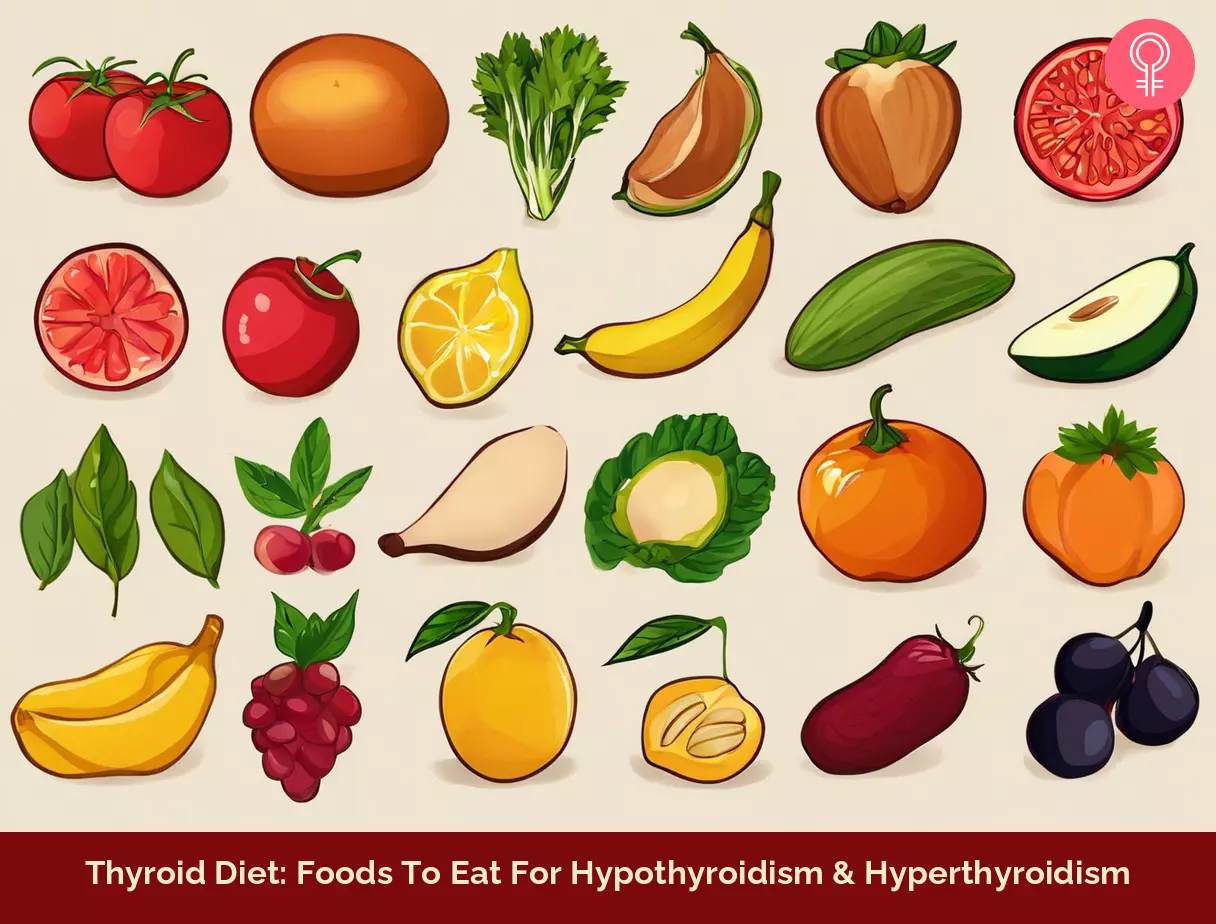
Image: Stable Diffusion/StyleCraze Design Team
References
Articles on StyleCraze are backed by verified information from peer-reviewed and academic research papers, reputed organizations, research institutions, and medical associations to ensure accuracy and relevance. Read our editorial policy to learn more.
- Physiology, Thyroid Function, StatPearls, US National Library of Medicine, National Institutes of Health.
https://www.ncbi.nlm.nih.gov/books/NBK537039/ - Thyroid Disease, Clinical Methods: The History, Physical, and Laboratory Examinations. 3rd edition, US National Library of Medicine, National Institutes of Health.
https://www.ncbi.nlm.nih.gov/books/NBK241/ - Severe Hypothyroidism and Large Goiter due to Iodine Deficiency in an Adolescent Male in the United States: A Case Report and Review of the Literature
https://www.ncbi.nlm.nih.gov/pmc/articles/PMC9646315/ - Barcza Stockler-Pinto, Milena et al. “EFFECT OF SELENIUM SUPPLEMENTATION VIA BRAZIL NUT (BERTHOLLETIA EXCELSA, HBK) ON THYROID HORMONES LEVELS IN HEMODIALYSIS PATIENTS: A PILOT STUDY.” Nutricion hospitalaria,
https://pubmed.ncbi.nlm.nih.gov/26545554 - Fox, T E et al. “Bioavailability of selenium from fish, yeast and selenate: a comparative study in humans using stable isotopes.” European journal of clinical nutrition vol. 58,2 (2004): 343-9.
https://pubmed.ncbi.nlm.nih.gov/14749756 - Bradberry, J. Chris, and Daniel E. Hilleman. “Overview of omega-3 fatty acid therapies.” Pharmacy and Therapeutics 38.11 (2013): 681.
https://www.ncbi.nlm.nih.gov/pmc/articles/PMC3875260/ - Köhrle, Josef. “Selenium and the thyroid.” Current Opinion in Endocrinology & Diabetes and Obesity 22.5 (2015): 392-401.
https://pubmed.ncbi.nlm.nih.gov/26313901/ - Williams, Graham R. “Actions of thyroid hormones in bone.” Endokrynologia Polska vol. 60,5 (2009): 380-8.
https://pubmed.ncbi.nlm.nih.gov/19885809 - Various Possible Toxicants Involved in Thyroid Dysfunction: A Review, Journal of Clinical And Diagnostic Research, US National Library of Medicine, National Institutes of Health.
https://www.ncbi.nlm.nih.gov/pmc/articles/PMC4740614/ - Dietary Goitrogens, US National Library of Medicine, National Institutes of Health.
https://www.ncbi.nlm.nih.gov/books/NBK285556/table/tyd-iodine-deficienc.goitrogenm/ - Assessment of Japanese iodine intake based on seaweed consumption in Japan: A literature-based analysis, Thyroid Research, US National Library of Medicine, National Institutes of Health.
https://www.ncbi.nlm.nih.gov/pmc/articles/PMC3204293/ - Palinkas, Lawrence A et al. “Psychoneuroendocrine effects of combined thyroxine and triiodothyronine versus tyrosine during prolonged Antarctic residence.” International journal of circumpolar health vol. 66,5 (2007): 401-17.
https://pubmed.ncbi.nlm.nih.gov/18274206 - Effect of Zinc Supplementation on Thyroid Hormone Function, Annals of Nutrition & Metabolism.
https://karger.com/anm/article-abstract/51/2/188/40455/Effect-of-Zinc-Supplementation-on-Thyroid-Hormone?redirectedFrom=fulltext - Investigation of iodine bioavailability from chicken eggs versus iodized kitchen salt with in vitro method, European Food Research and Technology volume 234, pages913–919.
https://link.springer.com/article/10.1007/s00217-012-1693-z#Sec11 - Iodine, US National Library of Medicine, National Institutes of Health.
https://ods.od.nih.gov/factsheets/Iodine-HealthProfessional/#h3 - Cocos nucifera (L.) (Arecaceae): A phytochemical and pharmacological review, US National Library of Medicine, National Institutes of Health.
https://www.ncbi.nlm.nih.gov/pmc/articles/PMC4671521/ - Seeds, flaxseed
https://fdc.nal.usda.gov/fdc-app.html#/food-details/169414/nutrients - Mohammadi-Sartang, M et al. “The effect of flaxseed supplementation on body weight and body composition: a systematic review and meta-analysis of 45 randomized placebo-controlled trials.” Obesity reviews : an official journal of the International Association for the Study of Obesity vol. 18,9.
https://pubmed.ncbi.nlm.nih.gov/28635182 - Legumes and Nutrition, Grains & Legumes Nutrition Council.
https://www.glnc.org.au/resource/legumes-nutrition/ - Dietary fibre in foods: a review, US National Library of Medicine, National Institutes of Health.
https://www.ncbi.nlm.nih.gov/pmc/articles/PMC3614039/ - A review of phytochemistry, metabolite changes, and medicinal uses of the common sunflower seed and sprouts (Helianthus annuus L.), Chemistry Central journal, US National Library of Medicine, National Institutes of Health.
https://www.ncbi.nlm.nih.gov/pmc/articles/PMC5622016/ - Omega-3 fatty acids decreases oxidative stress, tumor necrosis factor-alpha, and interleukin-1 beta in hyperthyroidism-induced hepatic dysfunction rat model, Pathophysiology, US National Library of Medicine, National Institutes of Health.
https://www.ncbi.nlm.nih.gov/pmc/articles/PMC2908954/ - Water, Hydration and Health, US National Library of Medicine, National Institutes of Health.
https://www.ncbi.nlm.nih.gov/pmc/articles/PMC2908954/ - Chandra, Amar K, and Neela De. “Goitrogenic/antithyroidal potential of green tea extract in relation to catechin in rats.” Food and chemical toxicology : an international journal published for the British Industrial Biological Research Association vol. 48,8-9 (2010): 2304-11.
https://pubmed.ncbi.nlm.nih.gov/20561943 - Hyperthyroidism, US National Library of Medicine, National Institutes of Health.
https://www.ncbi.nlm.nih.gov/pmc/articles/PMC5014602/ - Bhasin, Shalender et al. “Effect of Protein Intake on Lean Body Mass in Functionally Limited Older Men: A Randomized Clinical Trial.” JAMA internal medicine vol. 178,4 (2018): 530-541.
https://pubmed.ncbi.nlm.nih.gov/29532075 - Habza-Kowalska, Ewa, et al. “Thyroid Peroxidase Activity is Inhibited by Phenolic Compounds—Impact of Interaction.” Molecules 24.15 (2019): 2766.
https://www.ncbi.nlm.nih.gov/pmc/articles/PMC6696198/ - Endocrine Effects of Coffee Consumption, Turkish Journal of Endocrinology & Metabolism, ResearchGate
https://www.researchgate.net/publication/339891567_Endocrine_Effects_of_Coffee_Consumption - Thyroid Dysfunction and Sleep Disorders, US National Library of Medicine, National Institutes of Health.
https://www.ncbi.nlm.nih.gov/pmc/articles/PMC8423342/ - Association between dietary onion intake and subclinical hypothyroidism in adults: a population-based study from an iodine-replete area, US National Library of Medicine, National Institutes of Health.
https://pubmed.ncbi.nlm.nih.gov/34331679/
Read full bio of Madhu Sharma
Read full bio of Arshiya Syeda
Read full bio of Himanshi Mahajan






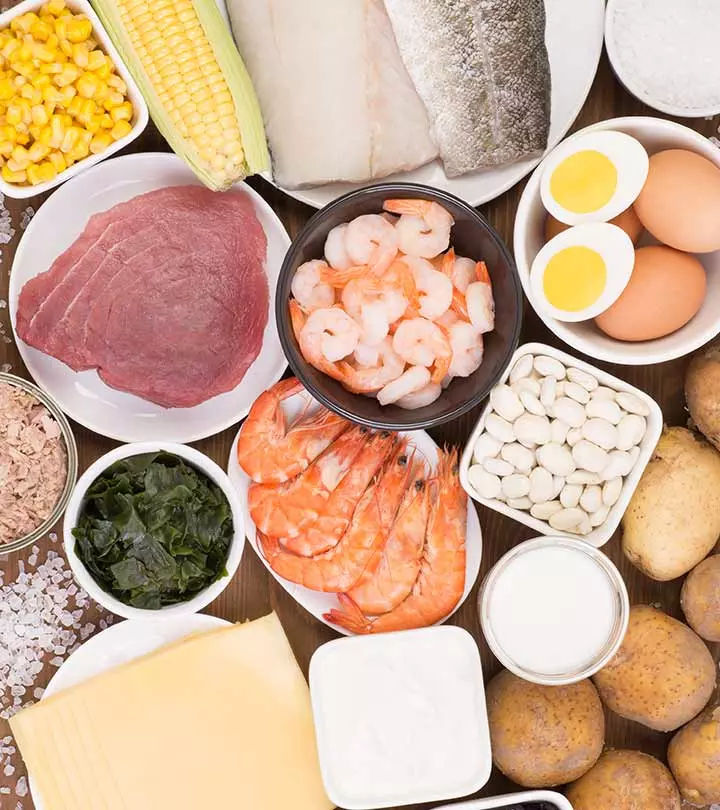

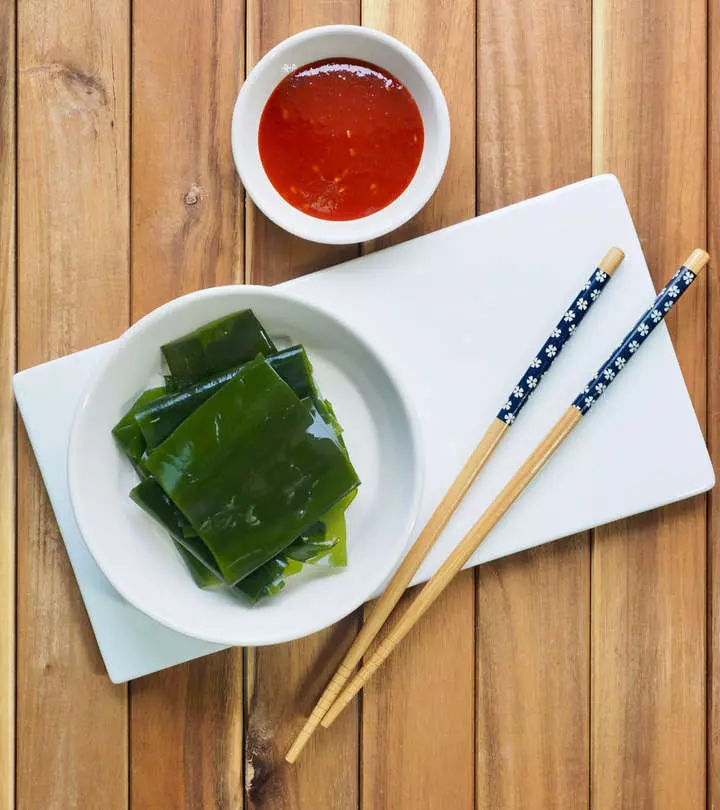
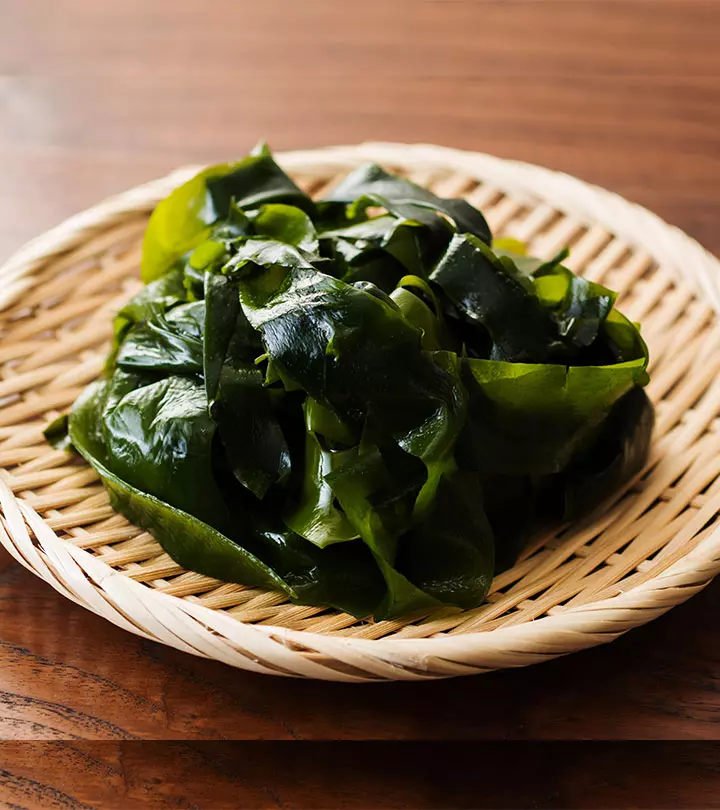
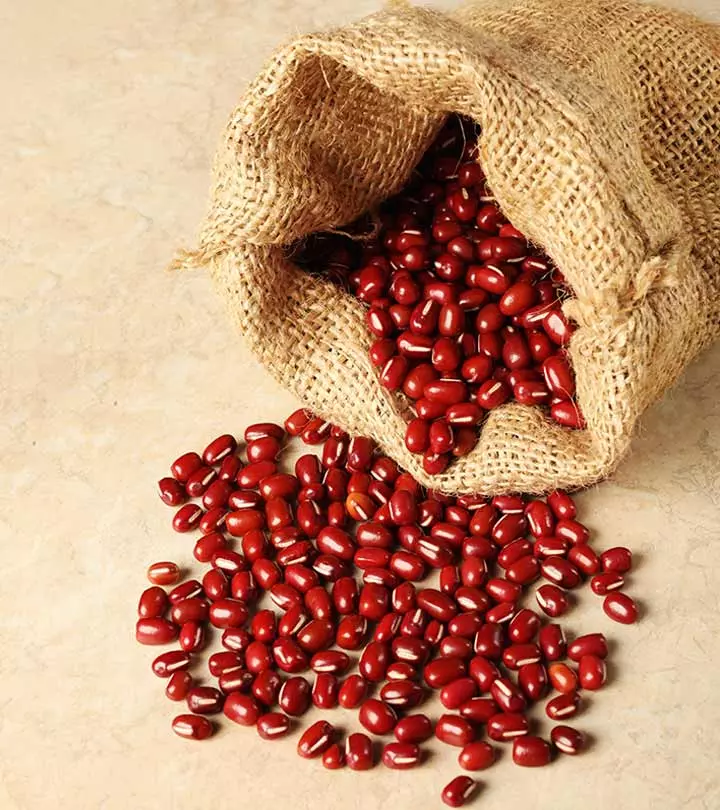
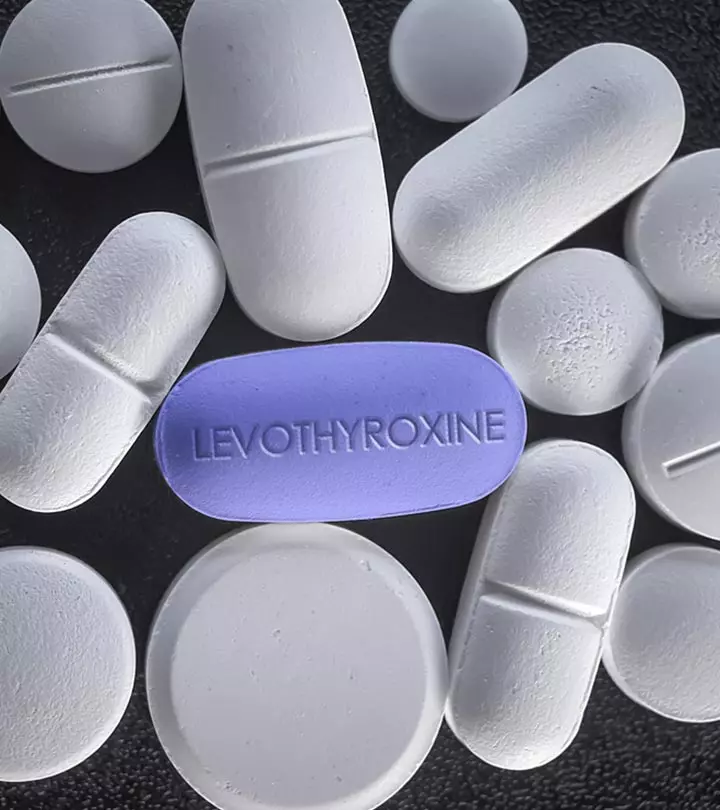
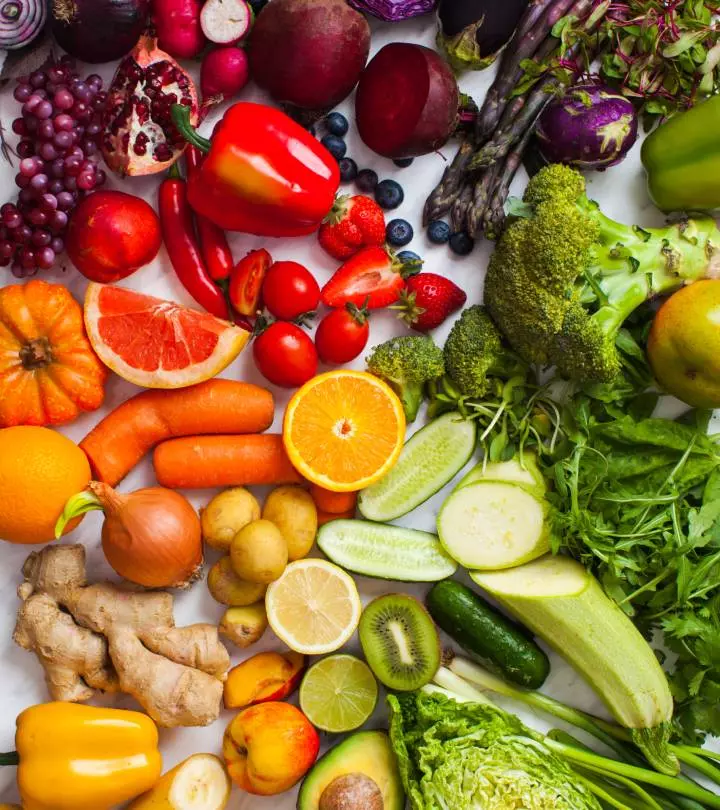

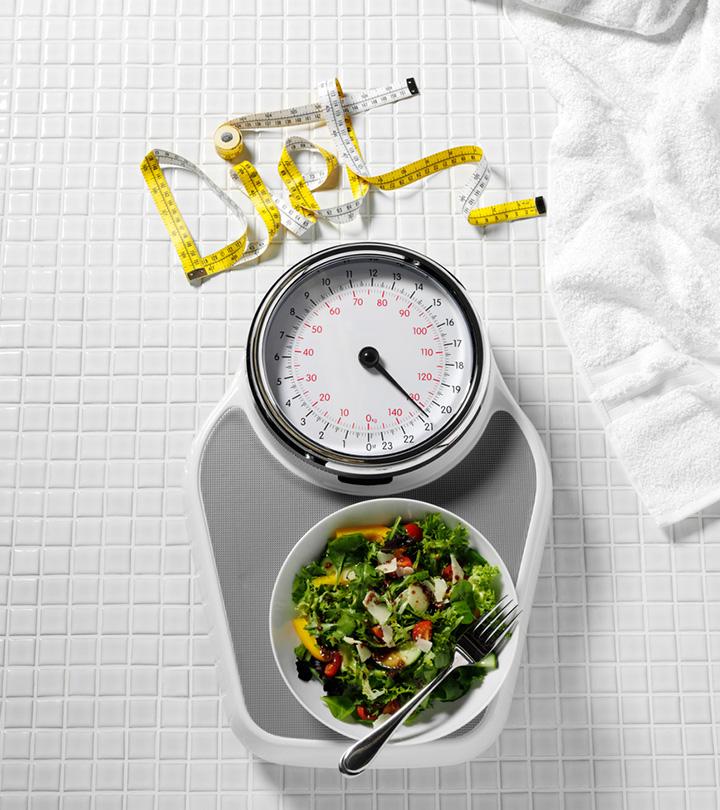

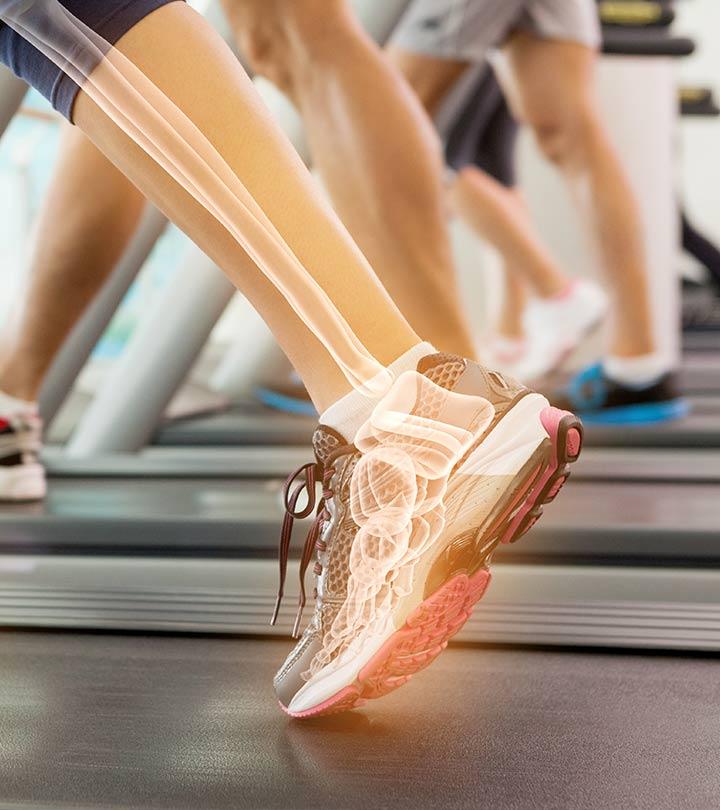
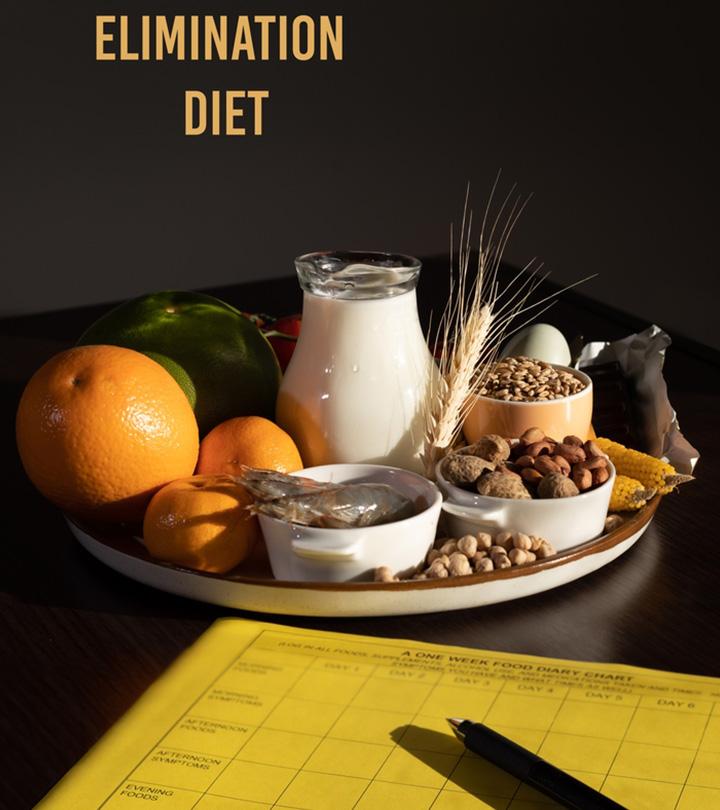
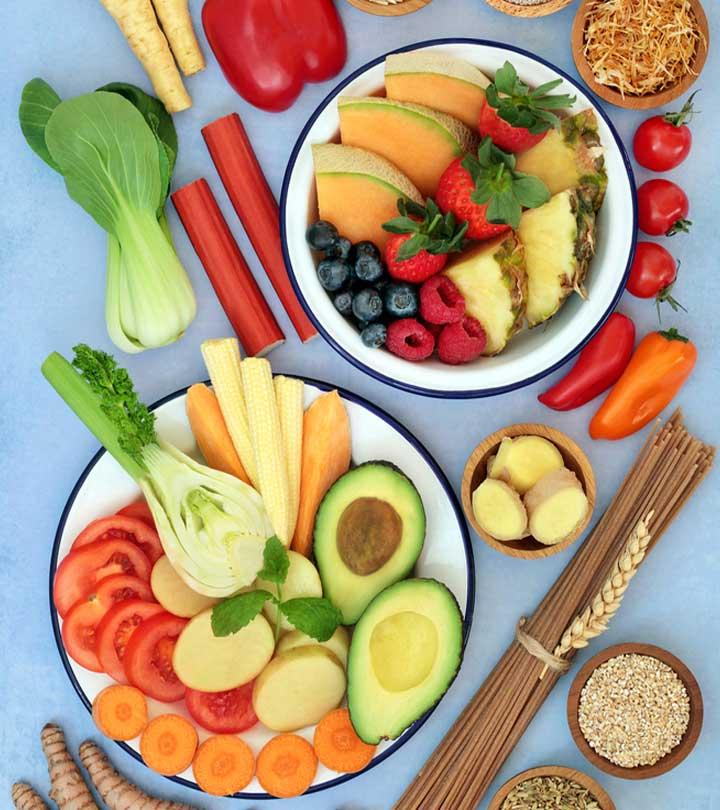
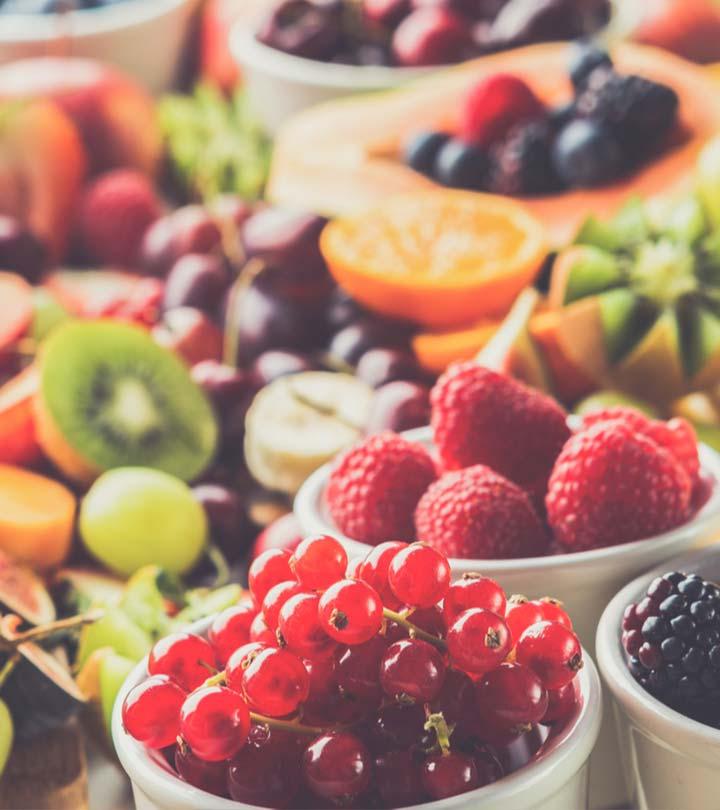
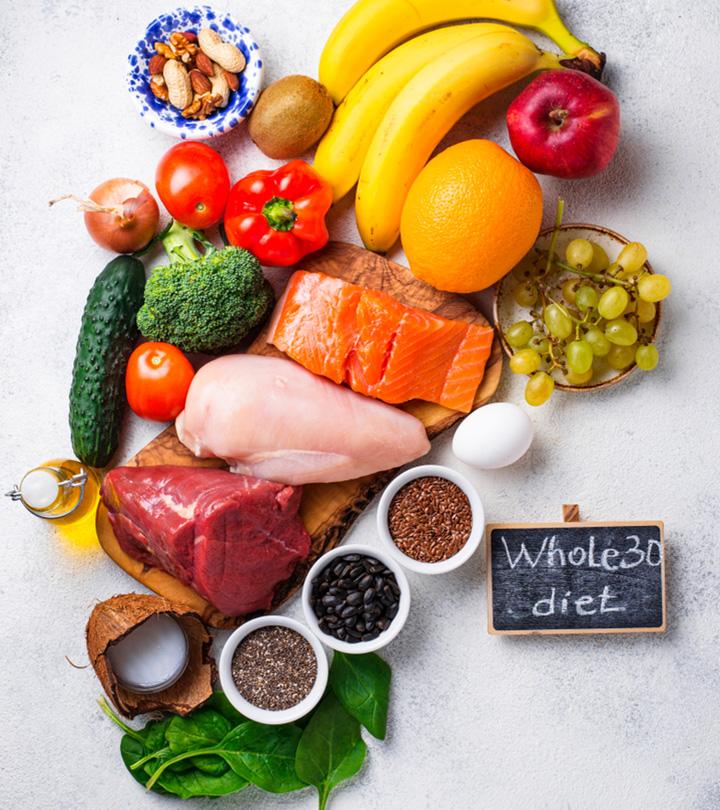


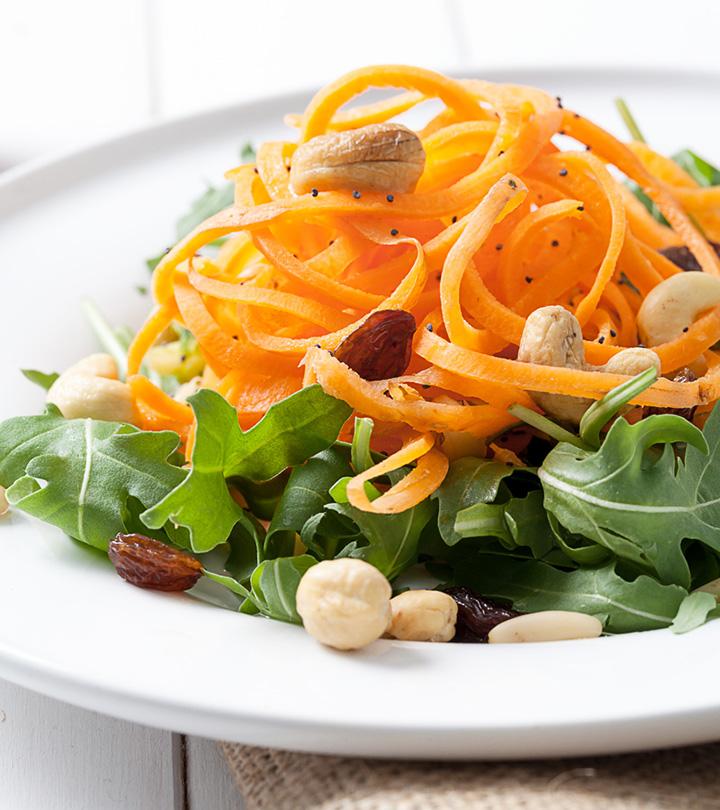


Community Experiences
Join the conversation and become a part of our empowering community! Share your stories, experiences, and insights to connect with other beauty, lifestyle, and health enthusiasts.